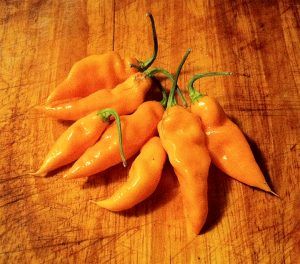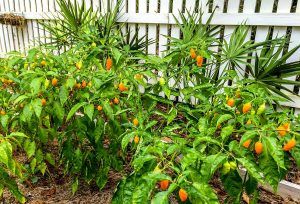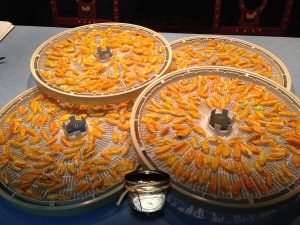
If you are a fan of spicy flavors, you’ll love growing and using Datil Peppers. These are a type of hot pepper, native to a region of North Central Florida, and they pack a punch of heat that is sure to add some excitement to your meals.
Centuries ago, settlers from Minorca, an island near the coast of Spain were brought to Florida around 1777. They settled in the St. Augustine area, brought here by the British to work as indentured servants in the area’s indigo and cotton plantations, and are credited with introducing the Datil Pepper to the region.
Datil Peppers are hot with a heat rating on the Scoville Scale at 100,000-300,000 units. To put this into perspective, Jalapeno peppers have a heat rating of 2,500-8,000 units, so Datil peppers are significantly hotter than Jalapenos. However, they are not quite as hot as some of the super-hot peppers like habaneros or ghost peppers, which have ratings of 100,000-350,000 units and 855,000-1,041,427 units, respectively. Datil peppers have a unique flavor that is described as a blend of habanero and cayenne pepper, with a slightly sweet and fruity taste. They are often used in spicy condiments and sauces, as well as in dishes like stews and chilis.
![]()
Cultivating Datil Peppers…

Being native to the St. Augustine area of Florida, Datil Peppers are well-suited to the warm, humid climate of Florida. They can be started from seeds indoors or purchased as seedlings, grown in containers, or transplanted into the garden.
Datil peppers need a sunny spot with well-draining soil. To plant, start preparing the soil by enriching it with compost or well-rotted manure, and space them about 18 inches apart. The plants will grow 2′ – 3′ in a season and are heavy producers, offering peppers around 2″ long. Water the plants regularly, keeping the soil moist but not soggy. Datil peppers are prone to pests such as aphids and mites, so be sure to keep an eye out for these and take steps to control them if necessary. Planting the peppers alongside vegetables such as tomatoes and eggplants can help to deter these pests.
![]()
Preserving Datil Peppers…

Datil peppers will take about 75-80 days to mature, at which point they will be ready to harvest. At our homestead, they are ready in July and if the weather is nice will continue to fruit into December! The peppers will start out green and will gradually turn orange or yellow as they mature. To harvest the peppers, simply cut them off the plant with a pair of scissors or a sharp knife.
There are several methods for preserving Datil peppers to enjoy their flavor all year round. Drying the peppers allows them to be easily rehydrated for use in sauces and stews. Freezing the peppers in airtight containers preserves their flavor and texture for use in a variety of dishes. Pickling the peppers in vinegar and spices creates a tasty condiment to serve with sandwiches and other dishes. Proper storage of preserved peppers, such as in a cool, dry place, helps to maintain their quality. Here at Tranquilla Cove we use a dehydrate to completely dry the pepper and store them to grind in different recipes. For our sauce and jelly, we use either fresh or frozen.
![]()
How we use Datil Peppers in the Cove Kitchen…
Datil peppers in cooking can be used in a variety of dishes, such as sauces, soups, marinades, jellies, and rubs. When handling the peppers, it is important to use gloves to avoid irritation to the skin or eyes! There are several remedies you can try to soothe the heat on your hands and fingers after cutting hot peppers:
- Wash your hands and fingers thoroughly with soap and water. This will help remove the capsaicin, the compound that gives peppers their heat.
- Rub your hands and fingers with alcohol or vinegar. These substances can help dissolve capsaicin and remove it from your skin.
- Use milk or yogurt to help soothe the burn. The fats in milk and yogurt can help neutralize the heat from the peppers.
- Use a mixture of baking soda and water to create a paste, and apply it to your hands and fingers. Baking soda can help neutralize the heat and provide relief.
- Apply a lotion or cream containing aloe vera to your hands and fingers. Aloe vera has natural soothing properties and can help reduce burn.
- If the burn is severe or persists, consider taking an over-the-counter pain medication, such as acetaminophen or ibuprofen, to help reduce the discomfort.
Our go-to Datil recipes from Cove Cuisine…
Datil Pepper Hot Sauce ~ Datil Pepper Jelly ~ Datil Pepper Jerk Marinade ~ Minorcan Clam Chowder ~ Minorcan Hush Puppies ~ Datil Pepper Salt
![]()
In conclusion, Datil peppers are a delicious and versatile ingredient that can be grown, preserved, and used in a variety of ways to put some Spice in your Life!
![]()



